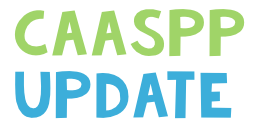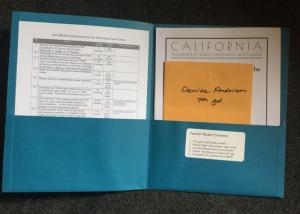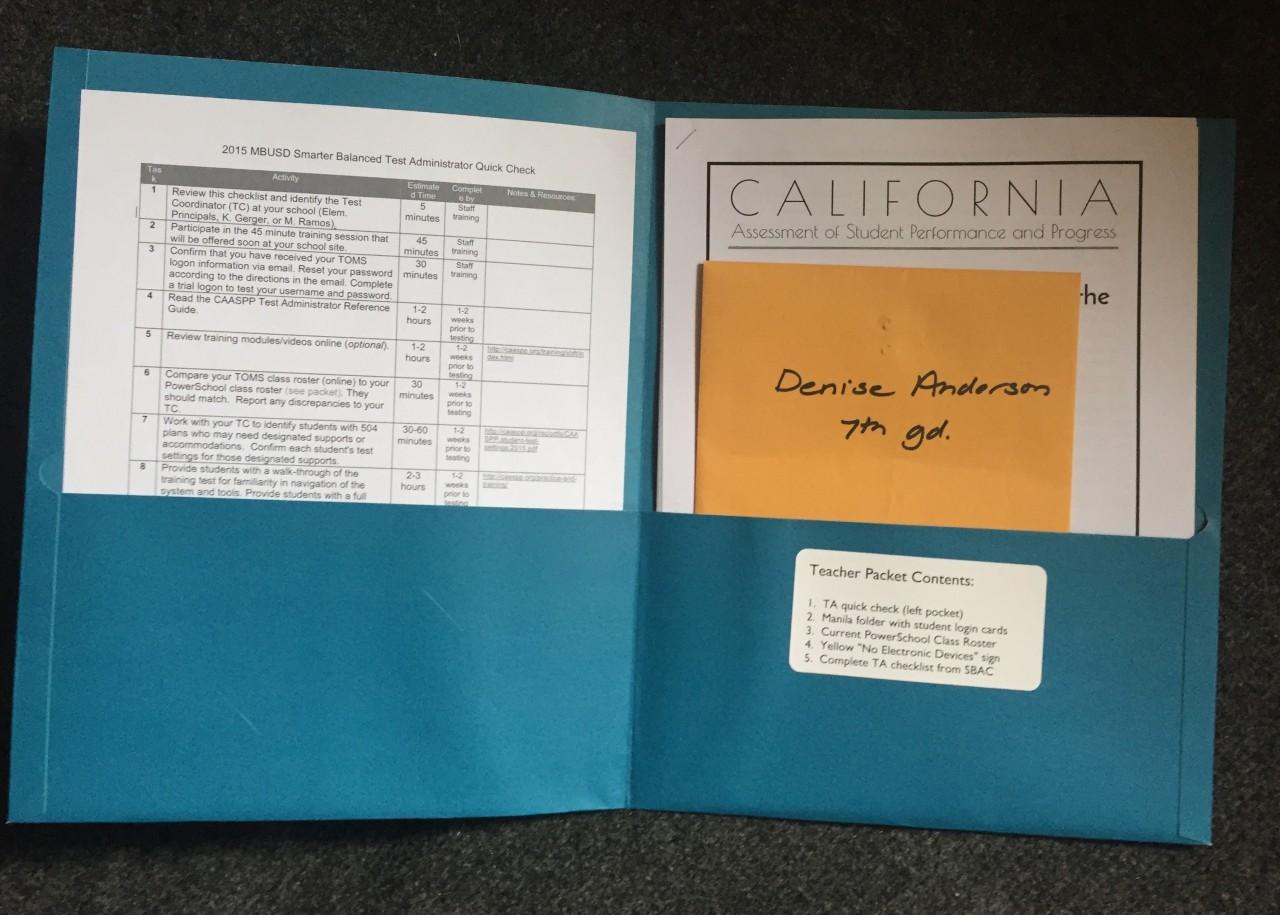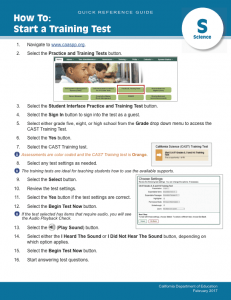Editor's note: Below is a communication sent out by the CDE on April 26, 2018 detailing some of the information regarding the transition from paper distribution of CAASPP test scores to the electronic distribution (e.g. secure PDF files sent via email to parents). The effort is being headed up by CDE and ETS and additional details are available in the CALPADS vendor notes. Dear County and DistrictSuperintendents and Charter School Administrators: CALIFORNIA ASSESSMENT OF STUDENTPERFORMANCE AND PROGRESS TRANSITION TO ELECTRONIC STUDENT SCORE REPORTS In spring 2014, California tookthe bold step of transitioning almost completely from paper assessments toonline assessments with ...
Postponement of Public Release of 2016–17 CAASPP Summary Results During the preview period of the 2016–17 CAASPP public Web reporting site, some local educational agencies (LEAs) identified a small number of cases in which test results did not appear to aggregate as expected to their district or charter school summaries. The CDE delayed the release of the statewide test results in order to investigate these reported cases. The issue impacts only the CAASPP public Web reporting site and the research files available from that site for 2016–17. Please be assured that the individual student achievement levels and scale scores that have been reported to your LEA or direct funded ...
Focusing on the California Assessment of Student Performance and Progress (CAASPP) System, including the Smarter Balanced assessments—a major component of CAASPP—and the California Alternate Assessments and science assessments. Accessibility Last month, the Smarter Balanced Assessment Consortium passed eight motions to update the Usability, Accessibility, and Accommodations Guidelines (UAAG). The changes, which apply only to specific CAASPP assessments, are as follows: New universal tools - Embedded thesaurus - Embedded line reader New designated supports - Non-embedded amplification - Embedded mouse pointer size and color New accommodations - Embedded braille transcript ...
Accessibility Notes: Multiplication Table Please note the following information about the Multiplication Table (PDF) External link opens in new window or tab., available through the CAASPP Portal External link opens in new window or tab It is a non-embedded accommodation available to students in grades four and above who have an individualized education program or Section 504 plan. For students in grade three who have a documented need, it must be requested as an unlisted resource in TOMS. The use of the multiplication table in grade three can be found in Matrix One: Universal Tools, Designated Supports, and Accommodations for the California Assessment of Student Performance and P...
To help teachers administer the Smarter Balanced CAASPP tests we made each teacher an info packet. Inside each packet we put a one-page summary of the steps they needed to take to become familiar with the test, learn how to administer it online, and provide the necessary signs and student ID cards. Basically we tried to make it as simple as possible. We included a one-page "quick check" since we knew they probably wouldn't read the whole 50 page manual :). We also printed out a "login ticket" for each student with their first name, SSID#, and class schedule (helpful when conducting make-ups). We included a class roster, signs, and other helpful items.
Focusing on the California Assessment of Student Performance and Progress (CAASPP) System, including the Smarter Balanced assessmentsa major component of CAASPP and the California Alternate Assessments and science assessments. February Downtime Coming Up The Interim Assessment Viewing System, as well as the Smarter Balanced practice tests and training tests, will be unavailable during scheduled downtime this month: 9 p.m. Wednesday, February 24, through 9 p.m. Sunday, February 28. All other CAASPP online systems will be available, and there will be no interruption to the interim or summative assessment Test Delivery System. The California Alternate Assessment (CAA) training tests will be loa...
February System Downtime Coming Soon During scheduled system downtime this month—9 p.m. Wednesday, February 24, through 9 p.m. Sunday, February 28—the Interim Assessment Viewing System and the Smarter Balanced practice tests and training tests will be unavailable. The interim and summative assessment Test Delivery System will not be affected. Mark your Calendar Now for System Downtime in April System downtown is scheduled to begin at 4 p.m. on Thursday, April 7, and end at 9 p.m. on Sunday, April 10, to load the California Alternate Assessments into the Test Delivery System. Issue 139 contains details on the particular systems that will be impacted. Report Test Security Incidents in STAIRS...
Focusing on the California Assessment of Student Performance and Progress (CAASPP) System, including the Smarter Balanced assessments, a major component of CAASPP, and the California Alternate Assessments and science assessments. System Downtimes: February, March, and April Tonight, February 24, at 9 p.m. through Sunday, February 28, at 9 p.m., the Interim Assessment Viewing System as well as the Smarter Balanced practice tests and training tests will be unavailable. NEW, March 18 at 5 p.m. through March 20 at 7 p.m., the Test Operations Management System (TOMS) will be undergoing system maintenance and will not be accessible. April 7 at 4 p.m. through April 10 at 9 p.m., system downtim...
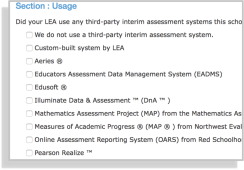
In my role as Director of Data & Assessment for Westchester Secondary Charter school I had the pleasure of supporting a research evaluation of the CAASPP/SBAC efforts underway in California. The Independent Evaluation Report was posted to CDE’s website today. You can find it at: http://www.cde.ca.gov/ta/tg/ca/caaspprptstudies.asp As an advocate for effective software systems and a participant in the study, I added my voice to the notion that the CDE should be looking much closer at existing 3rd party assessment systems. More than half of California's school districts have a 3rd party assessment system in place already, in ADDITION to the formative/summative resources available through CAASPP. The report explains in very understandable language the need to understand these 3rd party systems and the need to provide more integration resources to get data moving back and forth between systems. I also provided the investigative team with a list of known California assessment system providers. They incorporated that information into a survey (pictured above) which was distributed to school-site CAASPP coordinators (orange) and District CAASPP coordinators (blue). Though not a representative sample for state-wide assessment system adoption, it was interesting to see the results. Is the somewhat large discrepancies between what the schools are doing and what the districts are doing have any significance? Table source: http://www.cde.ca.gov/ta/tg/ca/caaspprptstudies.asp (Pages 45/46). A Note from Sunny Becker, one of the authors: This report includes results of our two 2016 studies: the CAASPP Smarter Balanced Interim Assessment Administration Study and the Access to Designated Supports and Accommodations Study. Many thanks to the representatives of Corona-Norco Unified, Fresno County Office of Education, Greenfield Union, Learning for Life Charter, Los Angeles Unified, Oakland Unified, Poway Unified, Salinas Union High, San Diego Unified, Tulare City, Victor Valley Union High, and Westchester Secondary Charter, who participated in one or both of these studies! Hooray Westchester Charter for helping to advance the assessment system conversation. Woot-woot!
March 20, 2017 Dear County and District Superintendents and Charter School Administrators: LAUNCH OF THE PILOT TESTS FOR SCIENCE The California Department of Education (CDE) is pleased to announce the launch of two new assessments for pilot testing, the California Science Test (CAST) and the California Alternate Assessment (CAA) for Science. These assessments will be available once your local educational agency (LEA) testing windows opens. Please note that students and schools will not receive results from the CAST and CAA for Science pilot tests. I encourage you to use this opportunity to begin the transition to the California Next Generation Science Standards (CA NGSS).&n...
CAASPP System Downtime Just a reminder: System downtime starts tonight at 9 p.m. and continues through January 18, 9 p.m., as part of final preparations for the Smarter Balanced Summative Assessments. During that time, the Test Administrator Interface and Interim Assessment Viewing System will be unavailable. Smarter Balanced Interim Assessments will not be available to administer or preview. New Reporting Process for Irregularities and Appeals Effective Next Week A new reporting process for test irregularities and appeals—the Security and Test Administration Incident Reporting System (STAIRS)—will go into effect on January 19, which is the same date the Smarter Balanced Summative Assessment...
CAASPP Update # 161 - July 6, 2016 Focusing on the CAASPP System, including the Smarter Balanced assessments—a major component of CAASPP—and the California Alternate Assessments and science assessments. Updated Usability, Accessibility, and Accommodations Guidelines The Usability, Accessibility, and Accommodations Guidelines document has been updated for the 2016–17 CAASPP administration. Among the changes are two new resources: - Simplified Test Directions (non-embedded designated support) - 100s Number Table (non-embedded accommodation) In addition, the recommendations on the use of scratch paper (non-embedded universal tool) now include the use of a whiteboard and marker as well as low-te...
A Weekly E-Mail from the California Department of Education
CAASPP Update
Focusing on the CAASPP System, including the Smarter Balanced assessments—a major component of CAASPP—and the California Alternate Assessments and science assessments.
Summer Hand Scoring Workshops Online Registration Coming Soon!
Educational Testing Service (ETS) will conduct one-day CAASPP Summer Hand Scoring Workshops in July and August. These workshops will train educators to score constructed-response items and performance tasks for English language arts/literacy and mathematics and to prepare students for the Smarter Balanced Summative Assessments.
The workshops, which will take place from 8:30 a.m. to 4:30 p.m., are scheduled as follows:
Issue 158
June 15, 2016
A Weekly E-Mail from the California Department of Education
CAASPP Update
Focusing on the California Assessment of Student Performance and Progress (CAASPP) System, including the Smarter Balanced assessments—a major component of CAASPP—and the California Alternate Assessments and science assessments.
Revised CAASPP Regulations Now Available
On May 18, 2016, the Office of Administrative Law approved California Code of Regulations for CAASPP. The CAASPP regulations are located on the California Department of Education (CDE) CAASPP System Web page under the “CAASPP Info” tab. Highlights of the revisions made to the CAASPP regulations include the following:
Section 851.5(c) clarifies eligibility for the Standards-based Tests in Spanish as a student in one of grades three through eight and grade eleven (1) whose primary language is Spanish and who is receiving instruction in Spanish; or (2) who is enrolled in a dual language immersion program that includes Spanish; or (3) who is a recently arrived English learner and whose primary language is Spanish.
Smarter Balanced Content Development Opportunities This Summer! If you are a California educator with the following qualifications, Smarter Balanced wants to hear from you regarding possible participation in content development activities: l Currently certified or licensed to teach English language arts/literacy (ELA) and/or mathematics in a K–12 public school or certified to teach English learners and/or students with disabilities.Currently teaching in a public school or currently employed by a public school, district, or state education entity, including higher education, located within a Smarter Balanced member state.Within the past three years:Have taught ELA and/or mathematics in grades three through eight and/or high school or worked in a classroom content support role, such as a literacy or mathematics coach or district/state content specialist.and/or Have taught students with disabilities and/or English learners in grades three through eight and/or high school or worked in a support role, such as a district/school coordinator or instructional specialist. Educators with specialization in teaching students with visual impairments or who are deaf or hard of hearing are encouraged to apply.Familiarity with part or all of the Common Core State Standards for the content area in which they are interested in working. For ELA item review, educators who have documented expertise in the area of science and/or social science may apply.Some opportunities will have additional preferred experience qualifications. The activities are taking place this summer, beginning in July, and selected educators will participate in a meeting that lasts four or five days. The content development meetings are as follows: Data review—review of field-tested items for possible content-related issues or accessibility-related issuesItem review—review of items before their being field-testedInterim assessment block/Digital Library connections—development of resources to connect the Digital Library with interim assessment blocks Apply by e-mailing Dixie Abbott, California Educator Involvement Coordinator,

